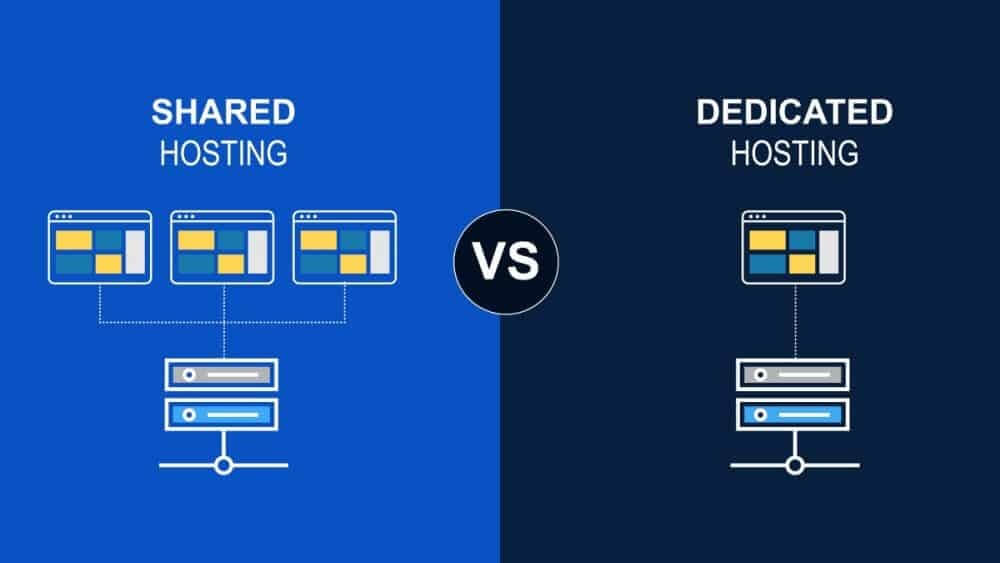Websites will be hosted on servers that are powerful hardware components containing websites and data on these websites. Every part of your website is stored and accessed via your Web Host on a server. This includes elements such as files, text, pictures, videos and etc. Servers are housed physically in data centers, typically run by web hosting firms and are run. In order to access your site online, web hosts provide the technology and the server space required. This gives users the opportunity to search and view their web pages online.
Different Types of Web Hosting:
1. Shared Hosting
The most basic type of web hosting is common hosting. For small or business websites, it is economic and the best choice. As the name suggests, websites that use shared hosting share resources on a single server with other websites.
This is one of the reasons why shared hosting in comparison with other web hosting types is so cheap. Each server website has a limited number of resources as defined by its own hosting plan. Shared web hosting can be contrasted with the sharing of a space with others in a building. You have your own bed, but you and your colleagues share resources throughout the house such as water, energy and common spaces. It has its disadvantages to share a server with other websites. If a traffic spike occurs on another website on your server, your site may trigger performance problems. These situations are out of hand. Therefore, if you want to save some money, shared hosting is certainly a great choice but probably won’t offer you or your website users the highest quality web hosting experience.
2. VPS Hosting
This hosting form is above the shared hosting of network. VPS stands for “virtual private server.” It is common for owners to migrate to a VPS when the website outgrows its shared plan. The website only shares one domain with other websites using a virtual private server. Nevertheless, there are significantly lower numbers of websites you can share with. The main server is divided into several Virtual Servers— that is why the name is. Such virtual servers can be individually personalized by websites. Even if the main server is shared with other websites, there is a VPS on your website. You will also get root access to your VPS hosting program for anyone wishing to execute custom configurations on your server. You do not use other websites to share resources, so your site will do better than with a shared hosting plan. This means that you can enjoy faster load times and higher uptime rates.
You don’t have to worry about a website that will crash your website. Some sites don’t need a particular server, so we’re going to get to the next one. Nonetheless, a VPS will give you a fraction of the price of professional hosting. A private virtual server is like a self-catering apartment. You will not share with any of your colleagues a kitchen, bathroom, living room or other common areas. This gives you a lot more flexibility and freedom to do what you want in the room. However, with the other units in your apartment, you must share some resources. If not, there will be some constraints.
3. WordPress Hosting
WordPress is the world’s most widely used Content Management and Web Server (CMS) which offers websites for people ranging from personal bloggers to small companies and even worldwide corporations. It can be used by experienced developers as well as new users with no experience in site design, so that it can be used in both general web hosting environments and the ones specifically dedicated to this Platform–a form of hosting known as managed WordPress web hosting.
4. Dedicated Hosting
A dedicated server is a single device on a network that is reserved to serve the needs of the network. Many networks, for example, require a single computer to handle communications among all other computers. The machine that handles printer resources could be a dedicated server.
However, remember that not everyone is committed to the servers. In certain networks, a computer may operate as a server and also perform certain functions. A dedicated server is usually a licensed service in the web hosting industry. The user rents from the host the server, the software and the Internet.
5. Cloud Hosting
Cloud hosting is a type of Web hosting that uses several servers for the load balance and maximization of uptime. Your website can tap into a cluster that uses resources from a centralized pool rather than using a single server. That makes for another server to keep everything running, even if one server fails. View the cloud as a web of the various interconnected computers. As the network connects more machines, the overall cloud will have more resources. You get a portion of the so-called cloud cluster with cloud hosting. Unlike traditional web hosting, you get some space from a single server. Cloud hosting primarily benefits from uptime, isolated infrastructure, simple scaling and a dedicated IP address




